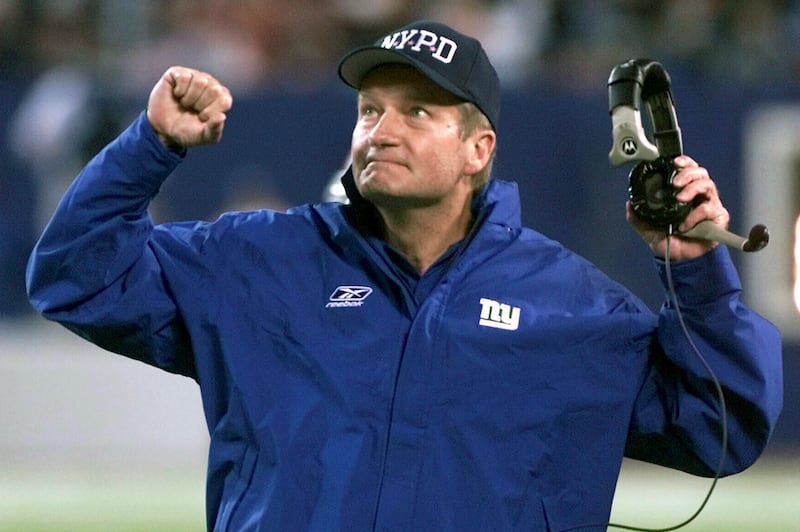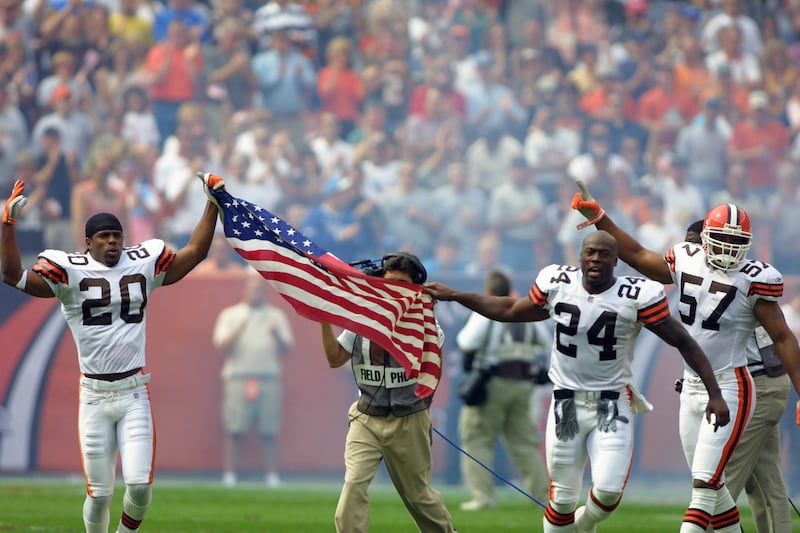There was a photo taken 12 days after the 9/11 attacks that nowadays appears quaint. Earl Little and Corey Fuller of the Cleveland Browns are running onto the field in Cleveland before a game with the Detroit Lions, and each of them is holding a corner of a large American flag. Fuller has both arms raised exultantly. They are trailed by teammate Dwayne Rudd, who is stabbing his right index finger into the air. They wear expressions of pride and defiance and they appear to be yelling something, exhorting themselves and the crowd.
Nobody is taking a knee or turning his back to the flag. Quite to the contrary. They are holding it aloft, loud and proud. They are united. This is pre-Colin Kaepernick, pre-Megan Rapinoe. Being patriotic, being American is still cool. There are no divisions — no liberals, no conservatives, no races — there are only Americans. Mix that with sports in a stadium of 70,000 fans who embrace the same cause and it’s powerful.
It’s an obvious point, but that’s what 9/11 did: It united the country, and sports became a rallying place as no other arena can. A lot of people wonder how 9/11 impacted sports. The truth is, it didn’t impact them in any permanent way, except that security was tightened, just as it was in airports and at our borders. But sports were in the middle of the recovery. Sports events and sports arenas became gathering places and galvanized Americans. The next couple of months were like one long pep rally.
New York
In October 2001, a few weeks after the terrorist attacks in New York, thousands gathered in that same wounded, smoking city for Game 3 of the World Series between the New York Yankees and Arizona Diamondbacks. President George W. Bush was scheduled to deliver the game’s traditional first pitch. It isn’t hyperbole to say the nation was watching, and, under the circumstances, the president knew he had to deliver. America was rallying; this was the man who was leading them. A pitch in the dirt just wouldn’t do; he had to throw a strike, and he had to do it while wearing a bulletproof vest. It was such a pivotal moment that ESPN would produce a documentary about it called “First Pitch.”
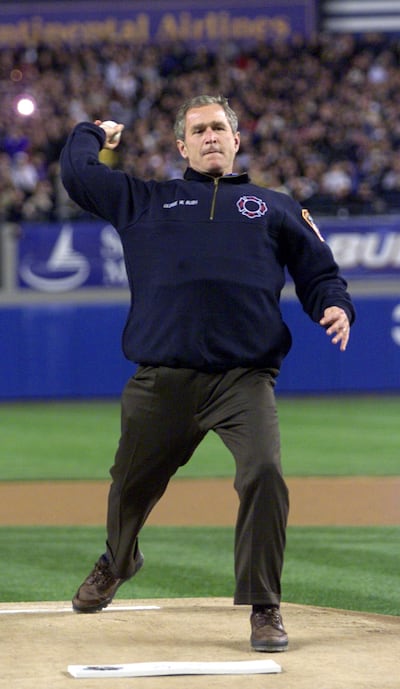
“The gravity of the moment never really hit me until the first step coming out of that dugout,” Bush tells ESPN. “I remember the noise and it was deafening. I remember looking around the stadium, this giant crowd. Standing on the mound at Yankee Stadium was by far the most nervous moment of my presidency.”
As Bush strode confidently and purposefully to the mound, wearing a New York City Fire Department pullover, he waved to the crowd. Turning to face home plate, he paused for five to six seconds to gaze up into the stands, giving the crowd a thumbs-up sign. He began a windup. He threw a strike.
“I had never had such an adrenaline rush as when I finally made it to the mound,” Bush told MLB.com. “I was saying to the crowd, ‘I’m with you, the country’s with you.’ ... And I wound up and fired the pitch. I’ve been to conventions and rallies and speeches: I’ve never felt anything so powerful and emotions so strong, and the collective will of the crowd so evident.”
As Bush posed for a photo with the managers, the crowd chanted, “USA! USA!” There were no partisan boos that night.
The role that sports played in the aftermath of 9/11 is widely recognized. The 9/11 Memorial & Museum created a section dedicated to that very theme, “Comeback Season: Sports After 9/11.”
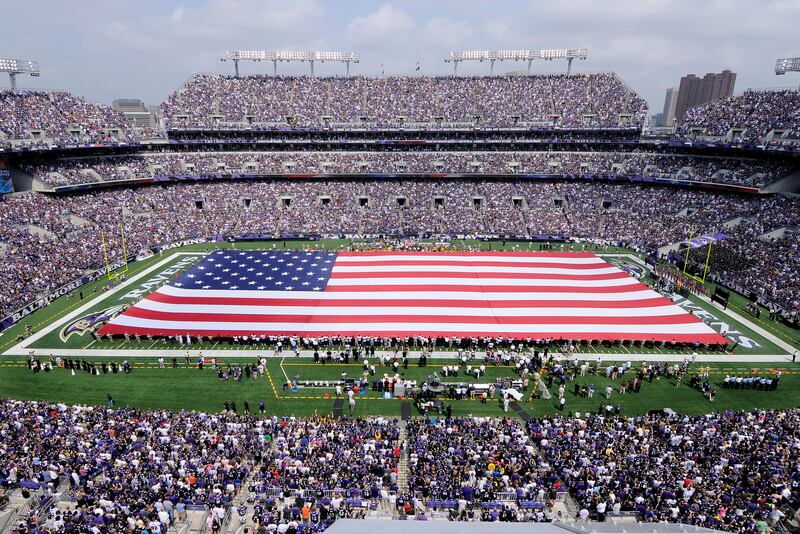
‘A Prayer for America’
When a memorial service was organized to honor the missing and the dead from 9/11, it was held in Yankee Stadium. They called it “A Prayer for America.” Sports were shut down for a few days in the aftermath of 9/11, but then they resumed and it provided a forum for angry, grieving Americans. Signs turned up spontaneously in the stands supporting America, New York, first responders, etc.
The New York Mets wore NYPD hats. Players from the Arizona Diamondbacks and the Colorado Rockies unfurled a giant American flag during pregame ceremonies 16 days after 9/11. The tattered and torn American flag that was recovered from ground zero was flown over center field at Yankee Stadium during Game 3 of the World Series.
In St. Louis, Jack Buck, the legendary Cardinals broadcaster, read an original poem called “For America” before the Cardinals-Brewers game. Firemen re-created the raising of the flag at the World Trade Center during pregame ceremonies for Game 1 of the World Series in Phoenix. The first game played in New York City after the attacks was on Sept. 21, featuring the Mets and Braves, with Mayor Rudy Giuliani in attendance. The New York Police Department Band took the field.
The NFL resumed play, too. The Giants beat the Chiefs in their first post-9/11 game under banners that read, “KC loves NY.” Chiefs fans cheered the Giants as they ran onto the field.
The terrorists hoped to crush Americans; instead, they united them in a way that hadn’t been seen since Pearl Harbor.
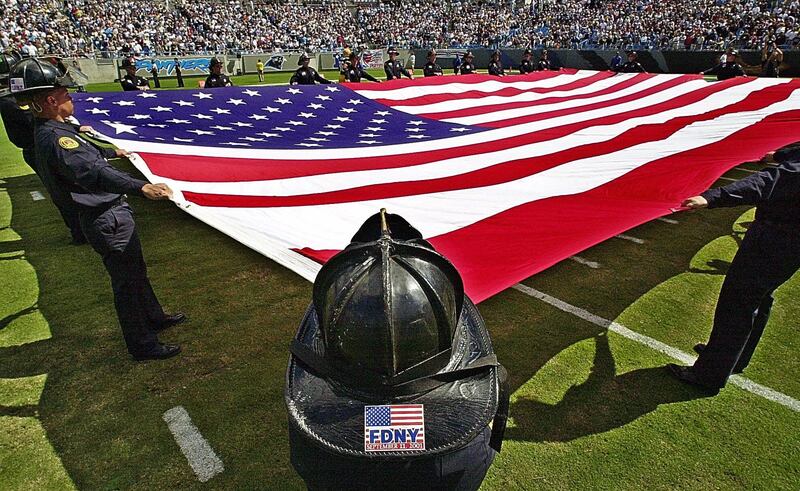
It wasn’t to last, though, as we know too well. Americans slowed down, as if looking at a roadside accident, and then moved on from it and went their separate ways. We have become divided. Unity and common cause have given way to hate, chaos, lawlessness, division. Sports, formerly the forum for unity, are now politicized and divided and have alienated many.
Immediately after 9/11 we thought our biggest enemy came from without, but now we know that our biggest enemy was from within. We are our biggest enemy.
In an essay for the Wall Street Journal, retired Gen. Jim Mattis, the former secretary of defense, wrote, “What concerns me most as a military man is not our external adversaries; it is our internal divisiveness. We are dividing into hostile tribes cheering against each other, fueled by emotion and a mutual disdain that jeopardizes our future, instead of rediscovering our common ground and finding solutions.”
We discovered common ground in the terrorist acts of 9/11. We haven’t found it since then. 9/11 changed us, but not the way we would’ve liked. It did not permanently unify us. Nobody would want to return to that day 20 years ago when airplanes were used as guided missiles, but we might want to return to the days and weeks that followed it.
